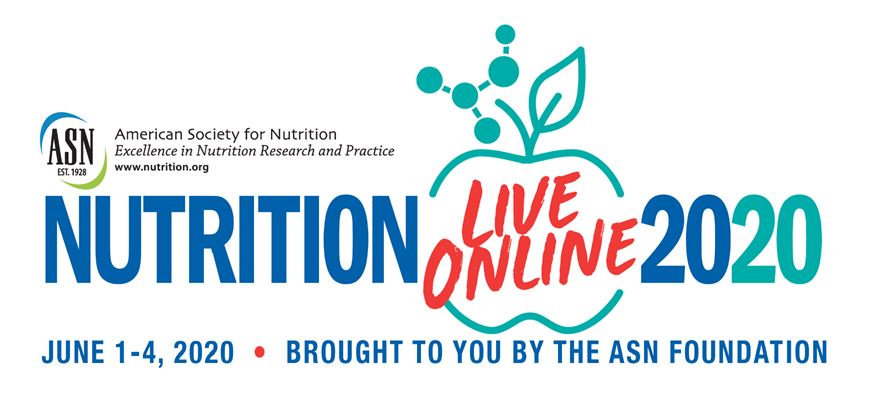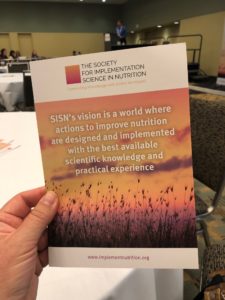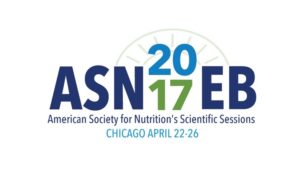SISN Co-hosts Interactive Virtual Workshop on Implementation Science and Covid-19 at ASN Nutrition 2020 Live Online
From June 1st to 4th, almost 30,000 people from around the world tuned in to the American Society of Nutrition’s (ASN) online conference for 4 days of learning and collaboration. SISN was thrilled to be a part of this interactive experience by hosting a live stream session on June 3rd. The 90-minute workshop “COVID-19 and Program Implementation: Implications for Implementation Science” highlighted the central role of implementation science in adapting to the challenges posed by the current pandemic. A recording of the live stream is available here until July 5th, after which date it will be accessible to ASN members only.
SISN’s Councilor-at-Large, Dr. Andrea Warren, University of South Carolina, started the session by welcoming attendees and introducing the three expert speakers poised to share their real-world examples of implementation research in nutrition programs.
First, Ms. Jennifer Crum, FHI 360’s Chief of Party who is currently leading a Multisectoral Nutrition Project in Bangladesh, discussed how COVID-19 is changing nutrition programs, what we are learning, and how we can prepare programs to respond to similar challenges in the future. In summarizing her presentation, Jennifer stated that “We need to ensure readiness for the future. The pandemic is teaching us that for nutrition programming, we need to ensure that we are ready to respond quickly to the needs that arise, and that we’re ready to ensure that services and goods are delivered continuously” (Figure 1). A PDF of the slides is available here.
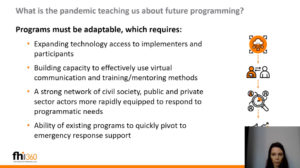
Figure 1
Second, Dr. Rasmi Avula, Research Fellow in IFPRI’s Poverty, Health, and Nutrition Division, based in India discussed coverage of essential nutrition and health interventions in the context of COVID-19 in India and highlighted some of the challenges faced by frontline workers to continue providing services and also take on new pandemic-related tasks. She highlighted an urgent need for systematic documentation of adaptations being made and learnings from those, as well as short, medium, and longer-term agendas for implementation science (Figure 2). A PDF of the slides is available here.
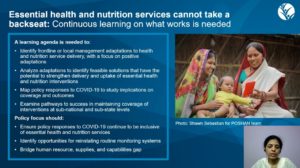
Figure 2
The third speaker, Dr. Ame Stormer, Helen Keller International’s Senior Technical Advisor for the Asia Pacific Region, discussed how organizations can create space for adaptive operations in the field. When providing background on the SAPLING project, Ame shared that “COVID-19 has presented an opportunity, albeit for horrible reasons, to engage in new approaches, some of which will hopefully create a nexus from relief to development, and some will advance a technological approach which we weren’t heretofore engaging in.” She proceeded to answer three questions 1) How the pandemic is altering program implementation 2) What questions about implementation arise from this scenario, and 3) How can information be obtained to address these questions? In concluding her presentation, Ame shared useful resources on COVID-19 of relevance to the maternal child nutrition space, in addition to example videos of the messaging being used by the SAPLING project (Figure 3). A PDF of the slides is available here.
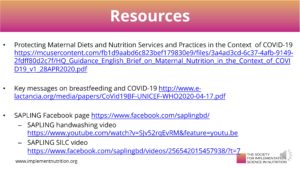
Figure 3
Prior to proceeding to an open discussion period, SISN’s Methods Councilor, Dr. Edward Frongillo, University of South Carolina, summarized the three presentations by highlighted four cross-cutting themes, namely the need for:
- Adaptation: Effects on and challenges for both implementers and participants require adaptations by frontline workers, managers, and participants. These involve remote work, monitoring of the work and virtual training, more isolation and less social support, and more reliance on technology, including the telephone and other forms of digital communication than before.
- Changes in delivery of services: On the one side, there have been changes in delivery points and the suspension of some delivery strategies. While on the other, the introduction of some new delivery strategies in response to COVID-19.
- Maintaining essential health and nutrition services: The need to respond to new and urgent needs that are being generated by the pandemic must be balanced with the need to maintain existing services. This raised issues about reach and coverage but also about how we can ensure the safety and comfort of people during the pandemic in accessing those services.
- Collecting and communicating information: New, quick and concurrent ways of communicating about what is happening are required. There is a need to continue to engage with current stakeholders and with new stakeholders such as private stakeholders, and questions about how best to adapt and respond to these challenges. We should collect data to learn about what is working and how to improve on implementation, and to capture what is being learned from this COVID-19 induced experiment for the future so that we are better prepared for similar kinds of challenges.
During the moderated Q&A, SISN’s Recruitment, Engagement and Outreach Councilor, Dr. Kenda Cunningham, Helen Keller International and Dr. Andrea Warren, fielded questions from a very engaged audience. Given the interest in this topic and insufficient time available for our expert speakers to respond, we are preparing a separate blog dedicated to these questions and answers, including responses to questions that were not posed during the live broadcast. Our hope is that sharing these insights and concrete tips will be helpful to those seeking to improve nutrition program implementation.
We welcome your thoughts, comments and questions on this topic. We’d be interested in hearing the key issues you’re facing due to the COVID-19 pandemic, and what you’re learning in the current context that will inform implementation practice or research in the future. Please reach out to: info@implementnutrition.org, as we would love to continue this conversation. We also encourage you to share the recording and this blog with anyone who may find it of interest and be interested in future SISN events.

